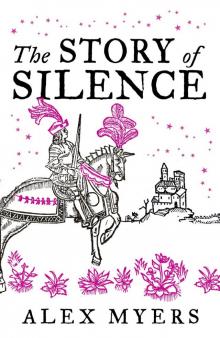- Home
- Alex Myers
The Story of Silence Page 8
The Story of Silence Read online
Page 8
For two or three days, the men would pursue a boar or bring back deer, to be strung up and dressed in the yard, and then they would disappear and leave behind only the gifts they’d bestowed and the stories they’d told ringing in Silence’s ears.
The horse was a fine gift. Silence named him Clopper. The groom taught him all one had to know about the care and feeding of a steed. He taught him what to look for in his eyes and ears, to show that he was ill, how to feel his legs to find tender spots that meant he needed rest. How to prise rocks from hooves and what salve to put on bee stings and a dozen other things besides. The seneschal taught him riding and as soon as he could wheedle permission, Silence took Clopper out every day. Most often, they rode into the woods, following deer trails and picking through the undergrowth. Silence would imagine himself on a quest, like the stories that Griselle told, a knight out searching for the white stag, or for the root that would heal his lady love.
And when he’d had enough of the woods, he would bring Clopper back out to the little forest track that connected Ringmar to the rest of the world and canter and gallop until both of them were breathless. Then he’d walk him slowly back to the stables and brush him down thoroughly. Once, he’d taken a long branch from the woods and spent the morning peeling the bark and pruning back all the little twigs, until it was quite smooth. Then he took Clopper out on the track and practised charging, holding the branch as if it were a lance. But Clopper kept turning his head and shying off to one side, as if he could get away from the lance. And the branch was heavy and slippery; Silence couldn’t hold it steady and kept dropping it. The fourth time he dropped it, he let it stay where it fell and slowed Clopper to a walk. If he were at Tintagel, he could see jousts, not just hear stories about them. If he were at Tintagel, he could learn how to joust, not just have to pretend with a branch. It wasn’t fair, and he didn’t understand why he had to stay out here, though when he asked, Griselle had a dozen answers to supply. Hot tears filled his eyes and dropped down onto the saddle. He leaned forward and hugged Clopper’s neck. The horse whuffed and nodded and carried him back to Ringmar.
When Griselle told him to practise his letters and his numbers, it was Clopper who was his audience. He fumblingly sounded out psalms to the horse as it patiently chewed oats. He counted as high as he could, forwards and backwards. And even when Silence grew better at such tasks, and could read the horse the stories from Griselle’s little book, and not just count but do sums, Clopper still regarded him with the same benign patience. That was what was best about the horse; he had large dark eyes that looked on Silence the same whether he was sulky or cheerful, whether he’d been scolded as a bad child for sneaking a cake from the kitchens or praised for helping Cook gut rabbits. Clopper didn’t mind, either way – or ask needless questions. Clopper would walk through cold water, gallop on a hot day, shrug off a snowfall. Clopper simply was. Silence thought the horse had a quiet wisdom to him, and understanding that surpassed his own.
There were tapestries that hung on two of the walls of the hall. Richly woven – the seneschal wasn’t sure of their provenance, but they were fine pieces, too good, almost, for a hunting lodge. They showed woodland scenes of hunting and riding and animals living in the forest. On winter evenings, when the sun slipped away so early and the dark came sneaking up fast, when the wind blew smoke down the chimneys, they would gather in the hall. Griselle sat nearest to the hearth, Mooch at her feet, and sewed in the firelight. The seneschal would whittle next her, or fletch arrows, and Mooch would swipe and snatch at the wood shavings or feather bits that fell to the ground. The fire would crackle and now and then they’d hear the sound of a wolf howling and the hounds rising up to answer.
Silence would study the tapestries. He’d long ago discovered – for there were many winter nights and many stormy days that he had spent in the hall – that the tapestries had depths to them. Out in front, there might be, say, a badger about to scurry into its hole. But peer into the brambles that had been woven behind the badger and, if you looked to the left of the gooseberry stitched there, you would see a tiny pisky, done in grey and white, with very pointed ears. So small, and yet, if Silence stared closely, he thought he could see the wryest little smile on that face, as if the pisky was considering surprising that badger by magicking a snake into its den.
And further down the tapestries, just at the spot where the firelight barely illuminated the fibres, there was a knight riding alongside a lady. The figures rose up, taller than Silence stood. He had a good eye-level view of the knight’s sword hanging from his belt. The weaver had taken care to get the pommel rendered accurately, stamped with the sign of St George, a cross within a shield. Silence could look at that sword for a while. And at the lady’s knees, he supposed, but these were less interesting, just folds of fabric as she sat side-saddle. He could crane his neck to study their faces; they gazed at each other, their lips mere inches apart, and to Silence they looked oddly blank, or maybe that was just the angle. More interesting was if he peered through the oak leaves and clumps of acorns around the lovers. In the depths of the woods, a Green Man stalked after a hind. The hind was red-brown, small. The Green Man was shaggy, with bark on his legs and leaves wreathing his face, his only weapon a club.
He could stare at these figures for ages, telling himself the tales of what they were up to. And even though he looked for them on many nights, he would swear that sometimes they moved or new ones were added, though he couldn’t say how. And most nights, the seneschal would call out, ‘Now then, young Silence, the howling of this wind (or the beating of this rain or the chill of this snow) brings to mind a story. Would you like to hear a story?’
And the answer was always yes and he would sit at the seneschal’s feet, the fire warming his back, and Mooch would climb into his lap and the seneschal might begin right away, and might clear his throat for a while and might ask Griselle which story she preferred (she always deferred to Silence) and if Silence was asked he would request, please, the story of the selkie.
‘Ah!’ the seneschal would say, as if this was a great surprise. ‘There are many selkie stories, but I’ll tell you the very best one. There once was a fisherman, who fished not too far from here, near the village of Treknow …’
The story was the length of two logs burning down. The seneschal would tell how the fisherman met a woman wandering the cliffs over the beach, a beautiful woman, and even before she spoke a word he fell in love with her. He begged her to marry him, but she would only come to visit. Sit briefly by his fire. Talk to him about the sea – the beauty and the peril. And then she would disappear. Sometimes she lingered for a day, sometimes but an hour. She always refused his offers to stay and eat a meal.
But one day, when she left his house, he followed after her. She went to the seashore, down past where the fishing boats were, along to a strip of beach, where she ducked behind some rocks. When the fisherman reached where she had been, he saw nothing. He looked all along the beach – no one. And nothing in the ocean but a few seals.
That’s when he knew. So the next time the woman appeared at his doorstep, he welcomed her, and built the fire high. She smiled, for she liked the warmth. And he offered her a mug of spiced wine, and she took it and sipped at it, and he told her of his week’s catch, and he asked her to marry him, to stay with him always, and she said no. And he refilled her wine and told her a story about how seagulls had attacked the priest the other day and she laughed and drank and grew drowsy and fell asleep.
Quick as a flash, the fisherman went down to the rocks by the ocean where she’d disappeared and searched about. He found a seal skin, grey and thick and damp, and took it to his boat, stowing it in a trunk beneath his lines and nets. Then he went home and waited for the woman to wake.
Well. She was trapped on land, wasn’t she? Without her skin, a selkie must remain human. She stayed with the fisherman, though she went often to the beach, searching for her skin. And she wept each time she didn’t find it. And she wept o
ften at night, too, sitting by the fire, listening to the waves crash, the waves she could no longer float in. And at last the fisherman, though he loved having her every day beside him, said, ‘Do you not love me? Do you love the sea so much that you must return to it?’ and he flung her skin at her. ‘I cannot stand to see you so saddened.’
And the woman stood, clutching her skin to her chest. ‘I do love you,’ she said. ‘And I love the sea. And it is my Nature to do both.’ She kissed him and walked to his door. ‘To you, it is a curse, that I cannot live with you all the time on the land. To me, it is a blessing, to have both the sea and the shore be my home.’ And she went out into the night, down to the beach, and never visited the fisherman again.
Silence would stand then, and put another log on the fire, and Mooch would arch her back and stretch. ‘Do you know,’ Griselle would say, letting her sewing rest on her lap, ‘that where I come from there are also stories of selkies, but it is usually a selkie man who comes ashore and seduces a beautiful woman and then abandons her.’
She would lick her thread and roll it between her fingers and stare at the seneschal, the firelight glinting off her bulbous eyes. And he would take out his whetstone and sharpen his knife and nod at the fire. ‘How interesting,’ he’d say and then the two of them would begin a slow, patient argument about fidelity. ‘Women,’ the seneschal might opine, ‘are the least faithful of God’s creatures.’
‘By the saints!’ Griselle would protest. ‘Have you never met a man? Why, there are soldiers and minstrels and sailors who have their way with women in every town they travel through!’
‘Ah. But do they always visit the same lass when they return home? They do! And that’s what it means to be faithful.’
‘Nonsense.’
On and on they’d bicker, and Silence would stare into the flames, thinking about the story. How salty a selkie skin would feel. What it would be like to put on another flesh. To be one thing and another at the same time. In the hall of Ringmar, in the middle of the forest, such a matter did not seem at all impossible.
There was a book of stories, Griselle’s most prized possession. Her father had given it to her. It had stories of saints’ lives. Silence liked these quite well, especially the one about Anthony, who went to the desert and lived in a cave and fought off demons. It also had stories about knights. And these, he begged for again and again. In truth, neither he nor Griselle needed the book; they could have recited these tales by heart. But holding the book and turning its pages, and seeing the illustrations put there was part of the story being told. And as Silence stumbled through his letters, and haltingly sounded out words to Clopper, and made his way through the Psalter, he eventually found that he could read the stories in Griselle’s book on his own. Sometimes he would stand beside her and they would take turns reading. Or he would read to her as she stitched, and he found it very satisfying to be the one telling the story.
Once, he had been out in the woods, running through them with a few of the hounds, and when he returned to the yard by the hall, where Griselle was pruning rose bushes, he had a stomach ache. ‘Go and lie down, then. I’ll make you a remedy to drink – just let me gather some herbs.’
Up in their chamber, Silence climbed into the bed. Griselle had left her embroidery basket there and also her book. He set the basket aside and stretched out, pulling the book close and turning its pages carefully. ‘The Story of St Anthony’. ‘The Life of St Agatha’. He paged through all the saints. ‘The Knight in the Cart’. ‘Yvain and the Damsel of the Fountain’. ‘Sir Gawain and the Green Knight’. And more! Griselle hadn’t read all of these to him. He sounded out the title, ‘The Knight with the Sword’, and began to read how Gawain encountered a sinister knight, who had a beautiful daughter. And the knight told Gawain to sleep – naked! – with that daughter. And they lay in bed kissing and the beautiful girl told Gawain not to do more than kiss, or a sword would fly out and kill him.
Silence thought this was a strange test of knighthood, but read on: how Gawain greatly desired the girl and moved to lie with her and a magical sword, all of gold, swooped down and cut him, once on the side, before he could roll away. And Gawain lay there, his desire gone, and his fear increased. Silence thought that if it were him, he would simply get out of that bed. But Gawain stayed in the bed and once again desired the girl, and once again the sword flew out and cut him.
He was so absorbed that he didn’t hear Griselle on the stair, and when she opened the chamber door, it was too late for Silence to put the book aside. She set down the bowl of herbs and hot water that she’d brought him to drink. ‘Which story are you reading?’ she asked.
‘“The Knight with the Sword”. I apologize if I shouldn’t have picked the book up.’ He glanced at her. ‘But why did you never read that story to me?’
A tiny line appeared between Griselle’s brows. ‘It’s a complicated one. Have you reached the end?’
He shook his head and she gave him the bowl to drink and when he was through, she said, ‘Then finish it now, while I am here.’
And he picked the book up and carried on. The sinister knight gave Gawain his daughter to marry. And his new wife went away with Gawain, bringing two greyhounds. They rode off and as they passed through a forest, a knight in black armour seized the reins of the woman’s horse and cantered off with her. Gawain had a sword, but no armour. Nonetheless he pursued them (this was more to his taste, Silence thought as he read). He caught up with the knight and challenged him, saying they should fight as soon as Gawain had armour to put on. But the other knight refused and instead said that the woman should choose between them. Gawain agreed, and his new wife chose the knight who had abducted her.
Silence looked up at Griselle, and she met his gaze and reached out and smoothed his hair back. ‘Carry on.’ So he carried on, reading aloud how Gawain rode off, the greyhounds with him, and the woman sent her new knight after Gawain to retrieve her hounds. But the hounds would not leave Gawain’s side. So the knight and Gawain duelled, right there in the forest. And though Gawain had no armour, he won, and slew the knight. Then the woman, Gawain’s new wife, rode back to his side. But he refused her and whistled to the hounds and trotted away, abandoning his wife in the forest.
‘I don’t understand,’ said Silence.
‘Which part?’
The truth was, many parts. ‘It isn’t valiant or kind or noble to abandon a woman in the forest, particularly one’s new wife.’
‘I agree.’
‘But Gawain is the greatest knight in the world.’
‘So the stories say.’
Silence touched the pages of the book, turning back to the start of the story, where the illustration showed a big bed with a sword suspended over it. ‘And why would a magical sword want to keep Gawain from loving the woman?’
‘There is a large difference between desire and love.’ Mooch hopped up on the bed and sniffed at Silence, then settled against Griselle’s side. She scratched the cat’s chin and Silence could hear the pleased purr. ‘Gawain feels desire for the woman. That is not noble. It is better to deny desire and feel love instead. Love is noble. Love must be won.’
‘But then he does love the lady, and then he abandons her.’
‘She abandoned him first, choosing the other knight. One must be faithful.’ She put a hand on his cheek. ‘I worry, sometimes, about your father’s decision to have you grow up out here, so far from court, so alone. There are so many things I can’t teach you, that one must learn from watching.’
‘But I will go to court some day. Won’t I?’
‘That is for your father to decide. Court is a busy place. Your father must be the ruler and mete out the king’s justice. And his knights must train and be ready for battle. Court is a place for men, not children.’
‘But I will be a man some day,’ Silence insisted. He stared at Griselle, who gazed back, her face implacable. ‘Won’t I?’ he whispered.
A moment of hush. Griselle stood up and Mooc
h hopped down with her. ‘That remains to be seen. For now, you are a child. How is your stomach?’
‘A little better.’
‘I’ll fetch a bowl of broth.’
And Griselle left the chamber and Silence turned in the book to a more familiar story, ‘The Fair Unknown’, sounding the words quietly on his lips, the tale of the beautiful young knight claiming a place at the round table, living there as a stranger, then proving his worth … yes, yes, that was knighthood. Belonging to a brotherhood, earning a place there through valour and worth – not because one was born to such-and-such a lord. This was a better tale than the one of Gawain and the magical sword; this was full of quests and fighting and good vanquishing evil.
When he finished, he set the book aside and closed his eyes. He would go to court. He would be valiant and courageous and true. He could prove himself, undertake a quest, vanquish a beast, resist temptation, show his father that he could be a man, whatever that meant.
There was a dirt-packed yard in front of the hall. Sometimes the chickens came around to peck out there. Sometimes the hounds would loll in the sun after the seneschal had taken them for a romp in the woods. For many years, Silence had enjoyed himself in the yard, setting up straw-filled targets and shooting arrows at them. He could stand with his back up against the kennels and let an arrow fly the whole length of the yard and hit a target no larger than a man’s head. It was something to be proud of, the seneschal had said. But not long after Silence had discovered ‘The Knight with the Sword’, shooting arrows didn’t seem like quite enough, and he asked the seneschal if he could teach Silence to be a knight. ‘Well, child, I don’t know about that, but we can make you a wooden sword to practise with.’ The seneschal was talented with all manner of carving, and he found the wood and they sat together in the yard and shaped it into a fine sword; they made two, in fact, one for Silence and one for the seneschal. And as they worked them to smoothness, the seneschal said, ‘Work the knife along the wood, with the grain. With wood and in life. Go with the grain. Else you’ll find it rough going.’

 The Story of Silence
The Story of Silence The APOCs Virus
The APOCs Virus The Time Change Trilogy-Complete Collection
The Time Change Trilogy-Complete Collection Time Change B2
Time Change B2 Time Change Book One: The Jump
Time Change Book One: The Jump